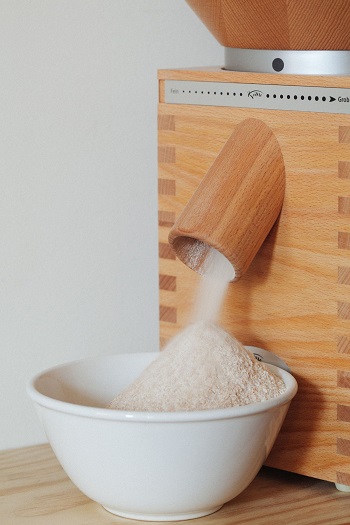Food & Drinks
Bakery Equipment: The Benefits of a Flour Mill
Тhe success of a bakery depends on many factors. From the recipes used to the types of equipment used, the location, and marketing. And perhaps most of all – on the quality of the flour. Flour is the main ingredient in baked goods from bread to biscuits, muffins and all pastries. So, when assembling your collection of bakery equipment, you’ve probably come across flour mills and wondered whether you actually need one and is it worth the effort to grind your own wheat.

While commercially processed flour is widely available to use, for a commercial bakery business, it’s not always the most optimal choice. Especially if you want to produce goods made of wholegrain flour. Read on to discover why you need a flour mill and how using freshly milled flour can benefit your business.
You Can Offer Healthy, Nutritious Products
Everyone knows that whole grain products are good for us. This is because grains are essentially seeds. And seeds are rich in a variety of essential nutrients from vitamins to fibre, protein, fat and starch. But there’s one catch. Commercially sold whole grain flour is typically made by mixing white flour with small amounts of wheat bran. Which means that many products advertised as wholegrain may only be a small amount more nutritious than those made using regular flour.
But even if you were to find 100% whole grain flour, it still might not be as nutritious as you think. Once these seeds are milled, their protective coating is damaged. This exposes some of the nutrients to the air and they begin to slowly oxidize and deplete. And the longer the flour is exposed to air and isn’t used, the more of its nutritional contents gets depleted.
That being said, by grinding your own grains instead of purchasing commercially milled flour can allow you to make healthier and more nutritious bread and other products grinding your own grains instead of buying commercially milled flour. And believe me, customers that are all about living and eating healthy will be able to tell the difference. By promoting your bakery as the home of goods made using freshly milled flour can give you a boost in customers.
Your Wholegrain Products Will Have Irresistible Flavour and Aroma

While bread and pastries made of freshly milled flours will certainly attract some client base, tastier products are the ones that will drive the most business. After all, no-one can resist a fluffy and aromatic pretzel. But in addition to retaining most of its nutritious content, freshly milled flour is also able to keep its characteristic, nutty flavour. Baked goods made of freshly ground flour are known to have more intense flavours and aromas and stronger colours compared to those made using commercially sold whole grain flour. Even people who generally don’t like the taste of wholegrain will find products made of freshly ground flour tasty.
What’s more, by milling your own flours you’ll be able to experiment with different tastes and textures and even come up with a signature flour that can be found no place else. You can use mixtures of the variety of grains out there from oats to rice, barley, rye, corn, sorghum, millet and buckwheat. Seeking to discover new flavours with the help of freshly milled flour can add a whole new element of adventure to your profession.
It’s Cheaper Than Buying Wholegrain Flour
Wholegrain flour has a very short lifespan. Because whole grain flour contains more fat than traditional flour it can go rancid a lot faster. Especially when it’s hot. As a result shipping and storing this type of flour is expensive for producers and retailers, which affects its end price. With that being said, if you’re a bakery that wants to use whole grain flour, it can be very expensive for you. This makes milling your own flour a much more cost-efficient option. This way, you can enrich your range with healthier, wholegrain products without it costing you a great deal of money. Additionally, you can offer your products for lower prices compared to other bakeries, and thus be able to attract more customers.
The Flour Won’t Go Rancid
As mentioned, wholegrain flour is expensive because it goes rancid very quickly. So, even if you can afford to purchase commercially milled whole grain flour, it may still not be the best idea. There’s a high chance you won’t get to use it up before it goes bad and have to throw some of it out. And this obviously means losing money. Additionally, even before it has gone rancid, wholewheat flour that has been out too long may result in products that taste sour and kind of off. In contrast, grains and seeds have an incredibly long shelf life, measured in years, That being said, if you want to ensure your products always taster fresh, milling your own flour is the way to go.
As a proud Pisces known for the selflessness, Olivia joined up the blog fascinated by the idea she can help readers with info on topics and their related benefits like health and beauty, travel, food and drinks. When not writing, she likes to call it a day reading comic books in the company of her Tonkinese cat Chatty or binge-watching The Big Bang Theory with her SO like the nerd she is.


























